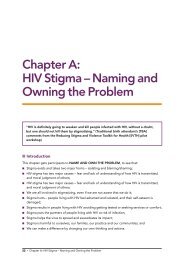Implementing Multiple Gender Strategies to Improve HIV and ... - ICRW
Implementing Multiple Gender Strategies to Improve HIV and ... - ICRW
Implementing Multiple Gender Strategies to Improve HIV and ... - ICRW
You also want an ePaper? Increase the reach of your titles
YUMPU automatically turns print PDFs into web optimized ePapers that Google loves.
Challenges <strong>and</strong><br />
Unforeseen<br />
Outcomes<br />
• Retention of evaluation participants was a challenge; it fluctuated<br />
around 70–75 percent in the intervention group. Some participants<br />
had other commitments <strong>and</strong> sometimes did not prioritize workshop<br />
attendance. Some participants did not attend because they were<br />
unwilling <strong>to</strong> travel in the dark.<br />
• Giving incentives may be perceived as undue inducement <strong>to</strong><br />
participate in research.<br />
• Programs of this nature in rural areas often employ many staff who<br />
have not worked in the formal sec<strong>to</strong>r before. Extra time is needed for<br />
problem solving <strong>and</strong> team building with inexperienced staff.<br />
Recommendations<br />
for Replication<br />
• The program can be implemented in both rural <strong>and</strong> urban settings,<br />
<strong>and</strong> with different languages (there are 11 official languages in South<br />
Africa) <strong>and</strong> age groups.<br />
• Training expertise, personnel, funding, training material, salaries <strong>and</strong><br />
local transportation support (monetary) are essential. Funds <strong>and</strong><br />
personnel are needed for the revision of the program <strong>to</strong> update<br />
policies <strong>and</strong> laws communicated in the sessions.<br />
• The <strong>Gender</strong> <strong>and</strong> Health Research Unit of the Medical Research<br />
Council of South Africa is willing <strong>to</strong> provide advisory support <strong>to</strong> any<br />
implementers interested in using the program.<br />
ADDITIONAL INFORMATION<br />
Program<br />
References <strong>and</strong><br />
Resources<br />
Published articles:<br />
Dunkle, K., R. Jewkes, M. Nduna, N. Jama, J. Levin, Y. Sikweyiya, M.<br />
Koss, et al. “Transactional Sex with Casual <strong>and</strong> Main Partners Among<br />
Young South African Men in the Rural Eastern Cape: Prevalence,<br />
Predic<strong>to</strong>rs, <strong>and</strong> Associations With <strong>Gender</strong>-based Violence.” Social<br />
Science & Medicine 65 (2007): 1235–48.<br />
Dunkle, K., R. Jewkes, M. Nduna, J. Levin, N. Jama, N. Khuzway, M.<br />
Koss, N. Duvvury, et al. “Perpetration of Partner Violence <strong>and</strong> <strong>HIV</strong> Risk<br />
Behavior Among Young Men in the Rural Eastern Cape.” AIDS 20<br />
(2006): 2107–14.<br />
Jewkes, R., K. Dunkle, M. Nduna, J. Levin, N. Jama, K. Dunkle, A. Puren,<br />
N. Duvvury, et al. “Impact of Stepping S<strong>to</strong>nes on Incidence of <strong>HIV</strong> <strong>and</strong><br />
HSV-2 <strong>and</strong> Sexual Behavior in Rural South Africa: Cluster R<strong>and</strong>omised<br />
Controlled Trial.” BMJ 337, no. 71 (2008): a506.<br />
Jewkes, R., K. Dunkle, M. Nduna, J. Levin, N. Jama, N. Khuzwayo, M.<br />
Koss, A. Puren, N. Duvvury, et al. ”Fac<strong>to</strong>rs Associated With <strong>HIV</strong> Seropositivity<br />
in Young, Rural South African Men.” International Journal of<br />
Epidemiology 35 (2006a): 1455–1460.<br />
Jewkes, R., K. Dunkle, M. Nduna, J. Levin, N. Jama, N. Khuzwayo, M.<br />
Koss, A. Puren, N. Duvvury, et al. ”Fac<strong>to</strong>rs Associated With <strong>HIV</strong> Serostatus<br />
in Young Rural South African Women: Connections Between<br />
Intimate Partner Violence <strong>and</strong> <strong>HIV</strong>.” International Journal of Epidemiology<br />
150
















